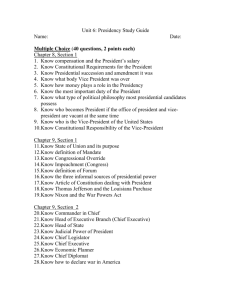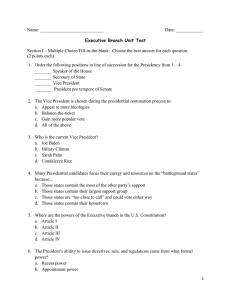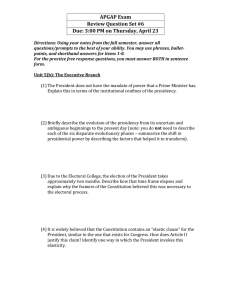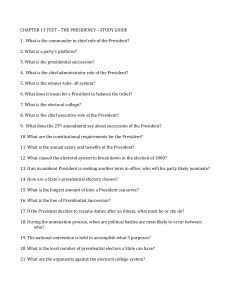February 27, 2007 The Honorable William L. Clay, Jr.
advertisement
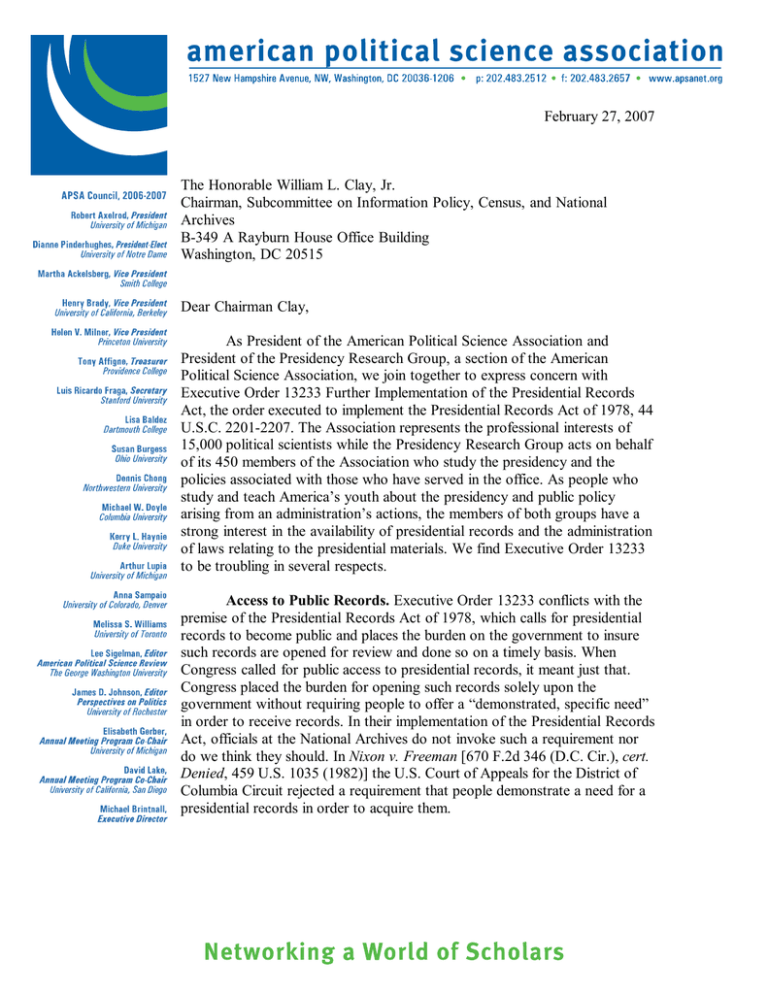
February 27, 2007 The Honorable William L. Clay, Jr. Chairman, Subcommittee on Information Policy, Census, and National Archives B-349 A Rayburn House Office Building Washington, DC 20515 Dear Chairman Clay, As President of the American Political Science Association and President of the Presidency Research Group, a section of the American Political Science Association, we join together to express concern with Executive Order 13233 Further Implementation of the Presidential Records Act, the order executed to implement the Presidential Records Act of 1978, 44 U.S.C. 2201-2207. The Association represents the professional interests of 15,000 political scientists while the Presidency Research Group acts on behalf of its 450 members of the Association who study the presidency and the policies associated with those who have served in the office. As people who study and teach America’s youth about the presidency and public policy arising from an administration’s actions, the members of both groups have a strong interest in the availability of presidential records and the administration of laws relating to the presidential materials. We find Executive Order 13233 to be troubling in several respects. Access to Public Records. Executive Order 13233 conflicts with the premise of the Presidential Records Act of 1978, which calls for presidential records to become public and places the burden on the government to insure such records are opened for review and done so on a timely basis. When Congress called for public access to presidential records, it meant just that. Congress placed the burden for opening such records solely upon the government without requiring people to offer a “demonstrated, specific need” in order to receive records. In their implementation of the Presidential Records Act, officials at the National Archives do not invoke such a requirement nor do we think they should. In Nixon v. Freeman [670 F.2d 346 (D.C. Cir.), cert. Denied, 459 U.S. 1035 (1982)] the U.S. Court of Appeals for the District of Columbia Circuit rejected a requirement that people demonstrate a need for a presidential records in order to acquire them. While White House officials have referred to national security needs as a reason for the promulgation of Executive Order 13233, we find no such need as existing law provides protection of such documents. Confidential advice records, which is the corps of documents the White House has been screening from the presidential libraries, lie at the heart of what people need to know about the operation of their government. In order to understand the decision making process, the public needs to know the chain of advice, the alternatives considered, and the arguments made in presidential discussions. The only way we can improve the operation of government, enhance the accountability of decision-makers, and ultimately help maintain public trust in its government is for people to understand how it has worked in the past. Presidential Privileges. We are concerned that the presidential privilege categories cited in the order go beyond the protected “confidential communications” found in the Presidential Records Act of 1978 to include the additional categories of “Presidential communications, legal advice, legal work, or the deliberative processes of the President and the President’s advisors.” As people who study presidential privileges, we do not agree these additional categories are recognized as constitutionally protected privileges. Nor do we believe an incumbent President should be required to support an assertion of privilege made by a former President without questioning the validity of the claim. A President is sworn to uphold the law and cannot, therefore, be placed in a position to support knowingly invalid claims of privilege. Additionally, we are troubled by the broad reach of the order, including the provision that following a former President’s death his representative and then his family can make privilege claims on his behalf. There is no constitutional basis for representatives and family members of a former President to assert constitutional claims related to an office they never held. By having no provision for disputed papers to ever be released, the order fails to recognize the weakening over time of claims of privilege. Yet in Nixon v. Administrator of General Services Administration [433 US 435, 451 (1977)], the courts have held privilege erodes over time. In that case, the court said privilege and the need to assert it “has always been limited and subject to erosion over time after an administration leaves office.” Thus, it is difficult to make the case for Chief Executives who have left the presidency to invoke privileges associated with the duties of the office they no longer hold. While White House Counsel Gonzales established a process that his successors have continued to have the Counsel's Office handle the record review, the order does not specify such a process. With the heavy work load carried by those serving in the White House Counsel’s Office, the reviews put additional pressures on an extremely busy staff. If the White House Counsel cannot review the records, any one designated by the President could take over the review, including someone without an expertise in records. Role of the Archivist. Executive Order 13233 effectively takes away from the Archivist of the United States his or her defined role as arbiter of records as provided for in the Presidential Records Act. Instead of acting as a facilitator of claims, the Executive Order requires the Archivist to carry forth a claim he or she may know to be a false one. The Archivist is ordered to withhold records when a former President requests it. Having the Archivist as the arbiter provided for in the Presidential Records Act is useful because when records disputes arise, he can facilitate solutions other than legal ones. If a person requesting records is denied papers, under the order his or her only recourse is to go to court, a costly and lengthy process. Lengthening the Process of the Release of Information. In addition to potentially increasing the expense of doing research by having to go to Court, the process represents an additional hurdle in terms of time. The presumptive review period in Executive Order 13233 is 90 days for the incumbent President and another 90 days for the former President whose records are in question. These review provisions are far removed from the provision in the original act requiring the government “make records available to the public as rapidly as possible.” [44 USC 2203 (f)(1)]. They are substantially greater than the 30day review period provided for in Executive Order 12677, which the current order replaces. Creating Tensions Within the Community of Presidents. The order could create friction within the select community of presidents through its provision allowing the incumbent President to deny the release of papers a former President designates to be made public. When the incumbent President and the former Chief Executive are of different political parties, his review of records will almost inevitably be viewed in a partisan context. Public suspicion could easily develop where an incumbent President could be viewed as easy in reviewing records from a President of his same party and as hard on the records of a former President of the opposing party. For the most part, theirs has been a collegial community and this order could add a note of acrimony in their relationships. Their relationship should be unfettered with arguments over the release of records. We applaud the manner in which the Reagan Library and the former President’s representatives carried out its duty to comply with the requirements of the Presidential Records Act to release confidential advice records twelve years after the close of its administration. Officials from the Reagan Library and the Office of Presidential Libraries established and then adhered to an orderly process for the consideration and release of documents. Their actions were taken prior to the issuance of Executive Order 13233. We believe there is no need for the Executive Order 13233 Further Implementation of the Presidential Records Act. Library and Archives officials were doing quite well in executing the act without the need for such an order. Respectfully, /s/ Robert Axelrod President American Political Science Association /s/ Lori Cox Han President Presidency Research Group
